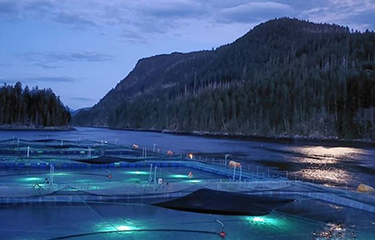A recently released report, commissioned by the British Columbia Ministry of Agriculture and Food and performed by Counterpoint Consulting, has determined that transitioning from net-pen salmon farms to land-based systems in the same communities isn’t economically feasible.
The report, “RAS Salmon Farming in British Columbia,” examined the current economic realities of the recirculating aquaculture system industry, and whether the technology is viable in B.C. communities. The B.C. government commissioned the report as Canada’s Department of Fisheries and Oceans has been initiating a “transition process” away from open-net-pen salmon farming in the province.
Canadian Prime Minister Justin Trudeau’s Liberal Party released a party platform in 2019 calling for a “transition [in British Columbia] from open net pen salmon farming in coastal waters to closed containment systems by 2025.” Then, in December 2020, the government started that process by suddenly announcing all salmon farming in the Discovery Islands in B.C. would be “phased out” in just 18 months, a move that drew sharp rebukes from “blindsided” communities and farmers who were forced to close hatcheries and cull fish.
While the DFO no longer appears to be proposing net-pen bans, there is still a push toward closed containment, land-based RAS salmon farms – but the new report found that in B.C. such farms would struggle to survive.
The report created an economic analysis that found that small RAS farms would not be economically viable, but medium and large farms could benefit from economies of scale.
However, even with viable farms, completely moving the salmon industry from net-pens to land would be extremely costly …
Photo courtesy of Cermaq Canada








